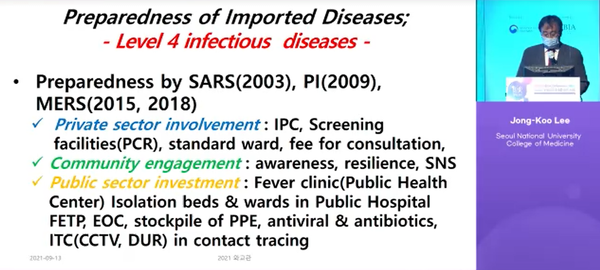The government should provide more support and human resources for the bio-health industry while working out policies and global strategies to better deal with infectious diseases, such as Covid-19, an expert said Monday.

“In conclusion, no one is safe until everyone is safe, and we must prepare and respond to the new infectious disease in future with global alliance and solidarity,” Professor Lee Jong-koo of Seoul National University said.
Professor Lee, who served as the director of the Korea Disease Control and Prevention Agency between 2007 and 2011, made these and other points at the global conference held by the Ministry of Food and Drug Safety to discuss challenges and responses to coping with the Covid-19 pandemic and similar situations in the future.
Lee noted that the Covid-19 virus originated in Wuhan, China, has developed into various variants. He then emphasized the need to develop a new vaccine that responds to the mutation of the novel coronavirus.
Lee pointed out that there is an increasing demand for equitable vaccine roll-out to less developed countries to reduce mortality and hospitalization. “About 75 percent of all Covid-19 vaccines have been supplied to only 10 countries, including Korea,” Lee said. “WHO Director-General Tedros Ghebreyesus has emphasized that a pause on booster shots could reduce global vaccine inequality and prevent the emergence of Covid-19 variants.”
The former KDCA head pointed to the importance of global and regional cooperation for scaling up vaccine production. He explained that Korea is ready to play a vital role in the worldwide production of vaccines, especially in Northeast Asia.
Lee said that the slowdown of vaccination in Europe, Israel, and the U.S. could hinder reaching a vaccination rate of 80 percent, threatening other countries and incubating the next disaster.
The SNU professor acknowledged that predicting what kind of infectious diseases to emerge in the future is difficult even for experts.
Lee said, “I previously asked Dr. Anthony Fauci about the possibility of predicting infectious diseases, and he responded that it is difficult to do so but emphasized the importance of early detection, early treatment, and vaccine development.”
Lee noted that Korea has long shifted to the “Live with Covid” phase as the nation did not lock down its borders and continued testing, tracing, and treating people, maintaining a relatively well-protected state until now.
“We began to grasp in-depth learning about the Covid-19 virus from our accumulated data on investigations and clinical trials, but we still need behavioral intervention and basic studies of development for vaccines and therapies,” he added.

